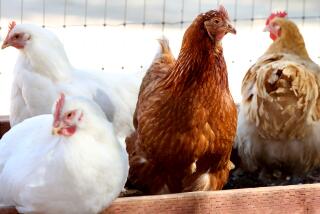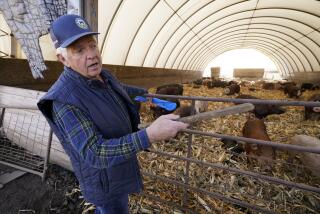Egg farmers and animal welfare group push for national standard on cage sizes
- Share via
If animal welfare advocates and the nation’s leading egg farmers have their way, the future is looking rosy for chickens — and Americans will probably have to spend a bit more for their eggs.
On Thursday, longtime adversaries the Humane Society of the United States and the United Egg Producers announced that they are jointly petitioning Congress for legislation that would require all farmers in the U.S. to adopt new standards on the size of cages used for hens that lay eggs.
The new standard would require enclosures providing at least 124 square inches of space per bird, up from a minimum of 48 square inches that’s now standard practice in many states. In addition, the enclosures would include perches for the birds, dust bathing and scratching areas, and nesting boxes for hens to lay their eggs.
Animal welfare advocates have long contended that some large U.S. egg producers treat their chickens inhumanely — and put consumers at risk — by keeping birds in cramped cages that stress the animals and raise the likelihood of sanitation problems and disease. A massive salmonella outbreak last year sickened more than 1,800 people in the U.S. and led to the recall of more than half a billion eggs. Inspections of the two Iowa mega-farms whose eggs were at the center of the recall found birds living in filthy, crowded conditions.
Such a federal standard would require the agricultural industry to stop using more-cramped “battery cages” for egg-laying hens, a practice that was at the heart of California’s Proposition 2, which aimed to bar the “cruel confinement” of farm animals. The proposition passed in 2008.
The cost of overhauling housing for nearly 300 million chickens is estimated to reach $4 billion, a sum that egg industry officials say would be covered by farmers. Some of those costs probably would be passed on to consumers, but just how much is unclear.
During a news conference in Washington, D.C., on Thursday, officials for the egg producers noted that U.S. consumers increasingly are demanding — and willing to pay more for — cage-free eggs and other products being raised in farm conditions more attuned to the animal’s welfare.
The Humane Society and United Egg Producers said their goal is to have a bill introduced and passed in the coming year, and phased in gradually until it is adopted industrywide by the end of 2029.
The organizations said that a uniform, federal standard mandating cage sizes — rather than the current hodgepodge of state laws and regulations — would be the best way to end their escalating battle over chicken battery cages.
The Humane Society has aggressively backed state legislation in recent years that alters how chickens and other animals are treated in the nation’s food-production system.
Last year, the group released undercover video footage shot at two of the nation’s largest egg farms showing workers slamming chickens into metal bins and dead birds littering cages. The organization has led campaigns to change state laws regarding animal welfare, and it has bought stock in publicly traded food companies to pressure executives to alter their purchasing decisions.
The agriculture community had fought back by lobbying in Washington and backing state anti-trespassing bills that would bar people from photographing farmland without permission.
As part of the agreement, the Humane Society said it would put on hold its efforts to push through local or state legislation that would define hen space. On Thursday, organizers backing ballot measures involving egg-laying hens in Oregon and Washington state said they have paused their efforts.
If passed, such a federal mandate may pose a challenge to California egg farmers. They are already wrestling with mounting costs and legal questions over how to comply with Proposition 2, which they must do by 2015. It is also unclear how federal oversight of this standard would be handled.
But Wayne Pacelle, president and chief executive of the Humane Society, said the industry shift was necessary and inevitable.
“If some of these farms don’t have the financial resources to change, then that sort of production practice needs to fade away,” Pacelle said. “We need federal standards that everyone understands and abide with.”
More to Read
Inside the business of entertainment
The Wide Shot brings you news, analysis and insights on everything from streaming wars to production — and what it all means for the future.
You may occasionally receive promotional content from the Los Angeles Times.










